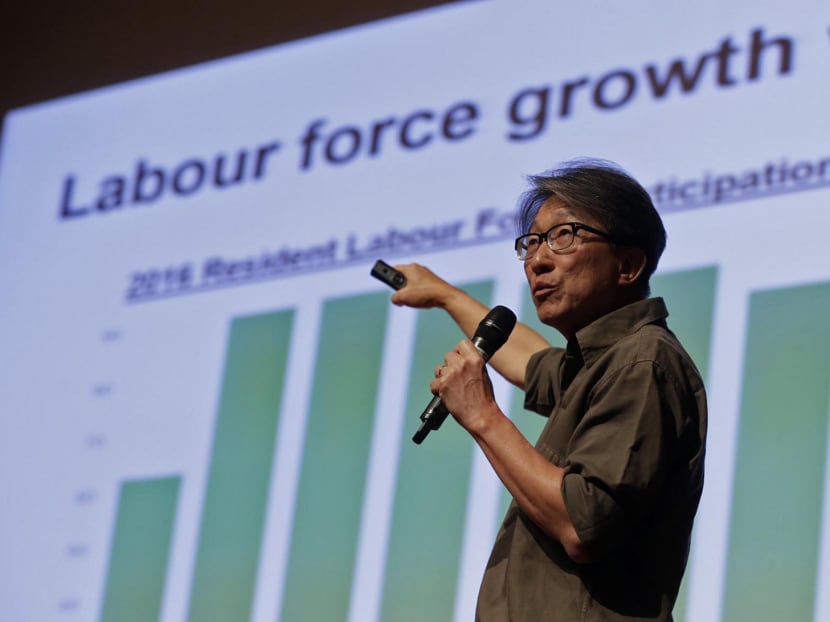Technology key to solving manpower crunch: Swee Say
SINGAPORE — While there are legitimate concerns in countries about technology putting workers out of jobs, such a worry would be largely unfounded in Singapore, said Manpower Minister Lim Swee Say yesterday, as he assured undergraduates who had the job market and economy on the top of their minds.

Minister of Manpower Lim Swee Say at Kent Ridge Ministerial Forum 2017 themed “Singapore’s Changing Demographics – Maintaining a Thriving Economy with a Diversified Workforce”. Photo: Wee Teck Hian
SINGAPORE — While there are legitimate concerns in countries about technology putting workers out of jobs, such a worry would be largely unfounded in Singapore, said Manpower Minister Lim Swee Say yesterday, as he assured undergraduates who had the job market and economy on the top of their minds.
The challenge facing the Republic is the shortage of workers, and technology will in fact help overcome this bottleneck, said Mr Lim.
Speaking at the annual Kent Ridge Ministerial Forum held at the National University of Singapore, Mr Lim fielded a host of questions from an audience of about 150 people — comprising mainly undergraduates — including what are the type of skills that undergraduates should equip themselves with, which industries will have talent shortages and the concept of job rotation within a company.
During the question and answer session, Mr Lim was asked about Microsoft founder Bill Gates’ recent suggestion of imposing a “robot tax” to mitigate the impact of automation technology on human job.
In response, Mr Lim noted that Mr Gates’ idea had been met with criticism. And as far as Singapore is concerned, he said, its stance is clear: Automation would be advantageous. “Our bottleneck is not jobs. Our bottleneck is manpower,” he reiterated.
Technology could help the workforce become more manpower-lean, and improve the quality of jobs, stressed Mr Lim.
“Instead of being fearful of technology, even if technology takes away jobs, (let’s) make sure that it takes away jobs from our competitors, not from us. So let’s run with the technology,” he said.
A student was also eager to know what skills one should have to thrive in the future economy. Mr Lim’s advice? Develop a strong foundation through a broad-based education, but “be good in something”.
Sharing his own experience, he recalled that during his undergraduate years at Loughborough University in the United Kingdom, he was horrified to learn that the electronics and computer systems engineering course that he was taking had a sizeable component on seemingly-unrelated subjects such as macroeconomics and human resources.
Together with his peers, they complained to the university. However, Mr Lim recalled, a representative simply told them: “Today, you’ll be upset with me. Ten years from now, one day, you’ll be grateful to me. I don’t foresee all of you remaining as engineers all your life.”
Looking back on his eventful career — he was with the National Computer Board as a software engineer before taking on roles at the Economic Development Board and the labour movement, and then becoming a Cabinet Minister — Mr Lim said he had realised the truth in those words.
He said: “At the end of the day, you do not know where your life will lead you. By having a foundation, it’ll be very useful.”
As to whether companies should provide job rotation for employees to pick up a wide range of skills, Mr Lim said that this was not practical from the firms’ perspective. Workers should not see job rotation as a “career objective”, he said.
Instead, they should focus on doing well and opportunities will arise, he noted.
Driving home the point that adaptability was key in the future economy, Mr Lim alluded to how small retailers at Queensway Shopping Centre banded together when Nike decided to stop supplying products to them from this year.
Without naming Nike, Mr Lim noted that the retailers approached a competitor and offered to promote their wares instead. “As an economy, we have to keep adapting,” said Mr Lim.
He added: “As a country, I can assure you, we’ll make sure that there are enough career opportunities ... But who will end up with which career, which job, I think a lot depends on you. If you’re flexible, adaptable and, hopefully, passionate about what you do, I’m sure your future will be bright.”
The theme of the forum was Singapore’s Changing Demographics — Maintaining a Thriving Economy with a Diversified Workforce.
In his speech, Mr Lim spoke about economic slowdown and its impact on employment growth. Among other things, he also discussed his ministry’s strategy for addressing the manpower bottleneck, starting with the transformation of all sectors of the economy using technology.









